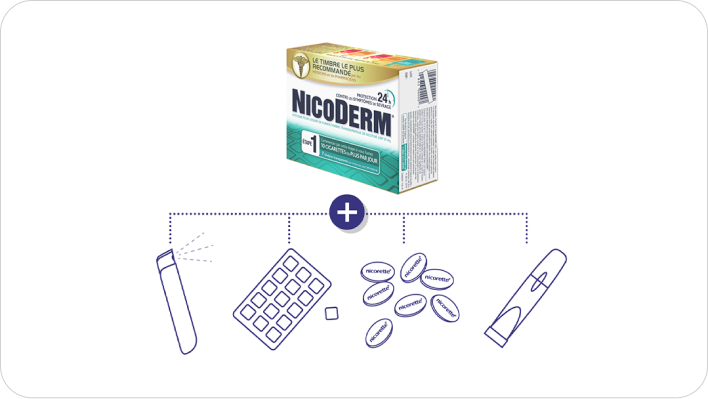What is combination NRT?
Combination NRT (nicotine replacement therapy) is the use of NicoDerm® patch plus an additional form of short-acting Nicorette® oral NRT (gum, lozenge, inhaler, QUICKMIST®) on an as-needed basis.
Who is a good candidate for combination NRT?
Patients who have used NRT in a previous quit attempt but relapsed
Patients who have had multiple failed quit attempts
Patients who feel they need something more than a patch or single NRT format
Patients who are experiencing breakthrough cravings or who have a high level of dependence
REDUCE TO QUIT® using combination therapy
How effective is combination therapy?
Comparator | |
|---|---|
Versus Monotherapy (Patch) | 1.3X more effective vs. NRT patch monotherapy (aggregated relative risk of abstinence of combination therapy vs. monotherapy: 1.58 [1.25-1.99] at 12 months)1 |
Versus Cold Turkey | Nearly 3X more effective vs. cold turkey: Compared to cold turkey, smokers using combination NRT were nearly 3X more likely to quit for good (OR 2.73; 95% CI 2.07-3.65)2 |
Why do some patients need combination NRT?
Smokers’ nicotine levels vary throughout the day, resulting in a gradual build-up of trough nicotine levels and regular nicotine peaks each time they smoke.3
Monotherapy may not be able to provide both high daily baseline nicotine levels as well as the nicotine levels needed during the craving phase.3
Combination therapy was 30% more effective at 12 months than monotherapy alone1
In a meta-analysis of first-line smoking cessation pharmacotherapies 6 months after quitting4:
Combination therapy was similarly effective to varenicline
Patch (>14 weeks) plus ad lib NRT (gum or spray): OR 3.6 (2.6, 5.2 - 95% CI)
Varenicline: OR 3.1 (2.5, 3.8 - 95% CI)

Combination NRT using patch + an oral form of NRT enables coverage of both peak and trough levels of nicotine.

References
1. NICODERM® Product License. February 16, 2016.
2. Reid RD, Pritchard G, Walker K, et al. Managing Smoking Cestiny mb-2 mb-lg-1tion. CMAJ 2016;188(17-18): E484-E492. Epub 2016 Oct 3.
3. Russell MAH, Feyerabend C, Cole PV. Plasma Nicotine Levels After Cigarette Smoking and Chewing Nicotine Gum. BMJ 1976;1(6017):1043-1046.
4. Fiore M, et al. A Clinical Practice Guideline for Treating Tobacco Use and Dependence : 2008 Update. Am J Prev Med 2008;35(2):158–176.
